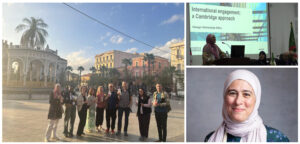Cambridge delegation visited the University of Blida 2 in the framework of “Strengthening Cambridge’s Connections with Algeria” (2025)
Based on the report entitled “Departments Initiate New Research Collaboration with Algerian Universities” (2025), published in the article section of King’s College London’s official website, and the report from St Catharine’s College, Cambridge, titled “Strengthening Cambridge’s Connections with Algeria” (2025), the April 2025 research and training programme held at the University of Lounici Ali of Blida 2 was met with enthusiastic and thoughtful responses from leading UK academics.
Dr Sura Qadiri (University of Cambridge), who led the Cambridge delegation, reflected on the intellectual rigour and engagement of Algerian doctoral students. She highlighted their remarkable fluency in English, confidence, and analytical insight, particularly during discussions on African and postcolonial literatures. In addition to praising the academic atmosphere, she noted the depth added by cultural immersion, visiting museums, artisanal exhibitions, and the Roman ruins of Tipaza. For Dr Qadiri, the event confirmed the importance of sustained partnerships and inspired her continued efforts through virtual seminars and cross-Maghreb collaborations.
From King’s College London, Professor Nicholas Harrison expressed deep admiration for the rich scholarly tradition he witnessed at Blida 2. He valued the trilingual format (English, French, Arabic) and the openness of dialogue on complex themes such as translation, Afrofuturism, and Fanonian thought. His interview on Algerian media further reinforced the significance of this initiative as a model for future academic diplomacy.
Professor Patrick Ffrench, also part of the King’s delegation, underlined the importance of equitable exchange and praised the breadth and critical ambition of the students’ work. He describes the experience as a “fantastic opportunity and a life-changing adventure”. Along with his colleagues, he viewed the visit as a powerful opportunity to rethink established academic narratives through meaningful collaboration.
These reflections point to a shared commitment to long-term engagement, mutual respect, and intercultural academic growth. The April training in Blida stands as a milestone in UK–Algeria relations in the humanities and sets the tone for ongoing exchange, with concrete plans for future joint research, staff and student mobility, and regional seminars.
Read More :
– Departments initiate new research collaboration with Algerian universities…
– Strengthening Cambridge’s connections with Algeria…

